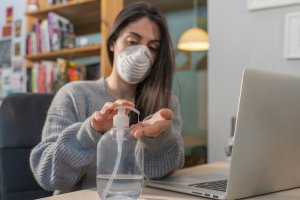Getting Help for Addiction During the Pandemic
The ongoing coronavirus pandemic is a widespread crisis that affects everyone. Disruptions and other circumstances during this tough and lengthy stretch create undue pressures more for some of us. Those seeking sobriety fall into this category. If you’re in this group or have loved ones to whom this applies, what is the way forward now? How can you or yours obtain the support and services needed?
If you are embarking upon or already on the path to recovery, the message is the same. Help is available for people struggling with substance use disorders. Those in treatment may need to adhere to new procedures or make adjustments in the resources they use and formats. The point is: the journey does not have to end at this time.
Here’s a short guide on options in the COVD-19 era.
Getting to ‘Go’
Often the hardest step is the first. In the realm of addiction treatment, there’s so much to consider at all times, not limited to the current global crisis. Insurance coverage. Free or fee-based services. Faith-based programs. Inpatient, outpatient, detox, funding, facilities and locations, local support. Which way do you turn and how, especially during the pandemic? Charting a route to recovery differs for everyone. Research the offerings, descriptions and stipulations. All of this helps in determining what you deem is best for you. Review this handy resource guide put together by American Addiction Centers. It offers an overview and lays out alternatives.
On-Site Recovery Centers, Services and Supports
Interested in professional around-the-clock treatment or outpatient help? Don’t rule any of this out now. It exists; you just need to do your homework. Many facilities treat people with substance abuse afflictions on a dedicated basis. A large segment offers 24/7 treatment; as such, participants live on the premises and receive a full course of treatment and related offerings. Centers also may provide outpatient offerings in various intensities or do so on an exclusively outpatient basis. Many inpatient and outpatient facilities remain open during the pandemic. Explore the status, schedule and contingencies. Regardless of the type, facilities have instituted provisions to protect those in treatment as well as staff. Temperature checks are routine, as are face masks and social distancing. Be prepared for stringent visitation policies or none at all; the same applies to guests at appointments.
Innovations: Virtual Alternatives
Welcome to the new world of support and treatment for addiction. That’s right – Zoom is not just for business and education. Tools like online meetings and telemedicine can help your recovery.
“Alcoholics Anonymous meetings have moved from musty church basements to laptop screens in quarantine. Do they still work?” That’s the intro to an article on “Staying Sober During a Lockdown” in The New York Times. The answer to the question posed in the headline is a resounding Yes. The word used to describe attendance at these sessions is “packed.”
It’s no wonder; the finding is that “many people who speak in meetings say they’re overwhelmed with relief to find these online gatherings, which are indeed coherent and powerful.” Look for a chapter(s) of a support group in your locality. Then see whether the group is meeting virtually or in person depending on prevailing conditions.
A recent opinion piece in The New York Times tackles “Using Telemedicine to Treat Opioid Addiction.” It notes the advent of regulatory changes during the pandemic. These have come about to accommodate the needs of people seeking help, including medication. As such, “treatment can now be entirely virtual, including the first appointment. Medicare now pays providers the same for a video appointment as a conventional one – many insurers and Medicaid programs have followed.” The posting goes on to note: “Patients can get a month’s prescription for buprenorphine instead of just a week’s.”
Once again, the main consideration is: does this form of treatment work? In the article, Silvana Mazzella, associate executive director of Prevention Point Philadelphia, weighs in on this point. She affirms this method; and she explains that her program has provided phones and no-data plans to those participants who needed them for this purpose. “It’s a reduction of the hassle, wait times, anxiety and fear of withdrawal in a waiting room,” she says. What’s more, “Telemedicine patients have proven more likely to fill their prescriptions than patients who had appeared in person in the past.”
There’s an App for That
Grab your smartphone or get one to help with your recovery efforts. Yes, there are apps for this. A posting on the American Addiction Center site lists several to help you stay sober. SoberTool counts the days users have been sober and the amount of money saved by not using. It does a lot more, e.g., supports for coping with a potential relapse or crisis, connections to a network of those in similar situations. Sober Grid is a sober social networking tool, sobriety tracker and support meeting finder wrapped into one. Not officially under the auspices of Alcoholics Anonymous (AA), the AA Big Book app brings the spiritual messaging of the group directly to you. It offers a range of features, e.g., prayers, personal stories, podcasts, meeting finders.
In all, don’t let the pandemic hinder your recovery. Help is here.
